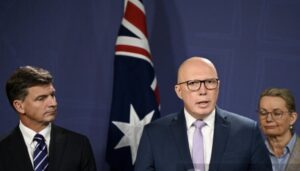‘Conservative’ and ‘Green’ are not two words that sit easily alongside one another. At least not in Australia, where “centre-right” governments installed federally and (until recently) in most of the states, have made it their business to dismantle climate legislation, undermine the renewable energy industry and champion coal.
And while ultra-conservative Prime Minister Tony Abbott has made some rookie mistakes, as American Review editor Tom Switzer puts it, staring down Australia’s green lobby over a “fanciful” emissions trading scheme, and the carbon tax, and the renewable energy target, is not considered one of them by the party faithful.
But in America – where for right-wing Republicans and far-right Tea Party members, climate change denial is an article of faith – something strange is happening with renewable energy.
In America, solar power has a new champion.
 Her name is Debbie Dooley, and she’s a Capital-C-Conservative. In fact, she’s one of 22 founders of the US Tea Party movement, sits on the Board of Directors of the Tea Party Patriots and is the Georgia Tea Party Patriots state coordinator.
Her name is Debbie Dooley, and she’s a Capital-C-Conservative. In fact, she’s one of 22 founders of the US Tea Party movement, sits on the Board of Directors of the Tea Party Patriots and is the Georgia Tea Party Patriots state coordinator.
She is also, however, the founder and leader of the Green Tea Coalition – a group initially formed in Dooley’s home state of Georgia to protect consumer access to solar, but which has grown into a “bi-partisan Coalition of Environmentalists and tea party activists seeking common ground on common sense energy solutions for a stronger American economy.”
And this week, Dooley’s Conservative Solar crusade even made it into the venerable New Yorker magazine.
My good friend and conservative solar champion @Crimsontider has made the New Yorker. Love it. http://t.co/jOMtfokVfz via @newyorker
— Scott Thomasson (@scotthomasson) February 18, 2015
Dooley, it seems, ‘gets’ renewable energy. Not only that, but she believes in the coming energy revolution. And, as she put it herself in August 2013 in an explainer on why she had formed the Green Tea Party, all of this does, or should, appeal to conservative minds.
“The premise is simple: Those who believe in the free market need to reexamine the way our country produces energy. Giant utility monopolies deserve at least some competition, and consumers should have a choice. It’s just that simple, and it’s consistent with the free-market principles that have been a core value of the Tea Party since we began in 2009.”
And she’s had plenty more to say since then.
“The reason I like solar is the average person can’t go out and build a new power plant but the average person can put solar panels on their roof… At some point, we are going to have to look at the structure of the monopoly utilities,” she said in an interview with Utility Dive. “I have a message for Republicans. If you are protecting monopolies, you are violating free market principles.
“For years, conservatives have been brainwashed into believing solar is bad. In the states where I am active, we don’t hesitate to call out those politicians and now a different message is being delivered.” And she tweets stuff you don’t see many Australian conservative politicians tweeting in Australia.  So what’s gone wrong in Australia? Why don’t we have any free-market conservatives making the case for solar energy?
So what’s gone wrong in Australia? Why don’t we have any free-market conservatives making the case for solar energy?
According to Matt Grudnoff, senior economist at The Australia Institute, the disconnect is mostly ideological.
“First and most importantly, (Australia’s Conservative politicians) have got it in their heads that renewable energy is a crazy Left idea.
“They’ve dismissed it purely because of who has advocated for it in the past,” Grudnoff told RenewEconomy in a telephone interview on Thursday.
Like Dooley, Grudnoff argues that traditional conservatives should be latching on to renewable energy, because it takes away power from big business.
In fact, there are a lot of “really good reasons” Grudnoff can think of as to why conservatives should like solar, including: a huge boost to industry, more jobs, better economic prospects, and creation of diverse regional jobs.
But the big one for “free market thinkers” is that “Rather than having a big utility company that has massive control over your energy, you install solar on your roof and take the power back.”
But Conservatives in Australia, he says, are far more wedded to big business than their US counterparts.
“Renewable energy like solar threatens big business. And while this is seen as a bonus in America, in Australia it is seen as a negative,” Grudnoff said.
“In Australia, lobbyists for fossil fuel generators – the big utilities – have done a very good job,” he adds. “They have turned the debate into an ideological one, wherein renewable energy is … just a green agenda to get coal off the map; so we’ll ignore the evidence and just focus on the fact that Australia is known for digging things out of the ground and sending it overseas.”
Of course, “there are parliamentarians in Canberra on the Liberal side who completely understand renewable energy and think it’s a part of the future,” Grudnoff says. “But speaking up now is not a great thing to do.”
 Chief among those Australian Conservatives who understand renewables would be Malcolm Turnbull. And although he’s not exactly speaking up about his progressive views on energy, he did give them an airing on Facebook recently.
Chief among those Australian Conservatives who understand renewables would be Malcolm Turnbull. And although he’s not exactly speaking up about his progressive views on energy, he did give them an airing on Facebook recently.
“Batteries have the potential to revolutionise the energy market, reducing peaking power requirements, optimising grid utilisation of renewables and in some cases enabling consumers to go off the grid altogether,” Turnbull wrote in January after a tour and testdrive at the Tesla factory in Fremont, California.
“The excitement of technology in the Bay Area is exhilarating…..but not quite as palpable as the jolt you feel when you hit the accelerator!”
It’s a fact, says Grudnoff, that “if Malcolm Turnbull was PM now instead of Tony Abbott, we’d be having a very different discussion on the RET right now.”
But he’s not, and with Abbott coming out of the recent leadership spill attempt more resolutely reactionary than ever, perhaps he never will be.
Green Tea, Malcolm?










